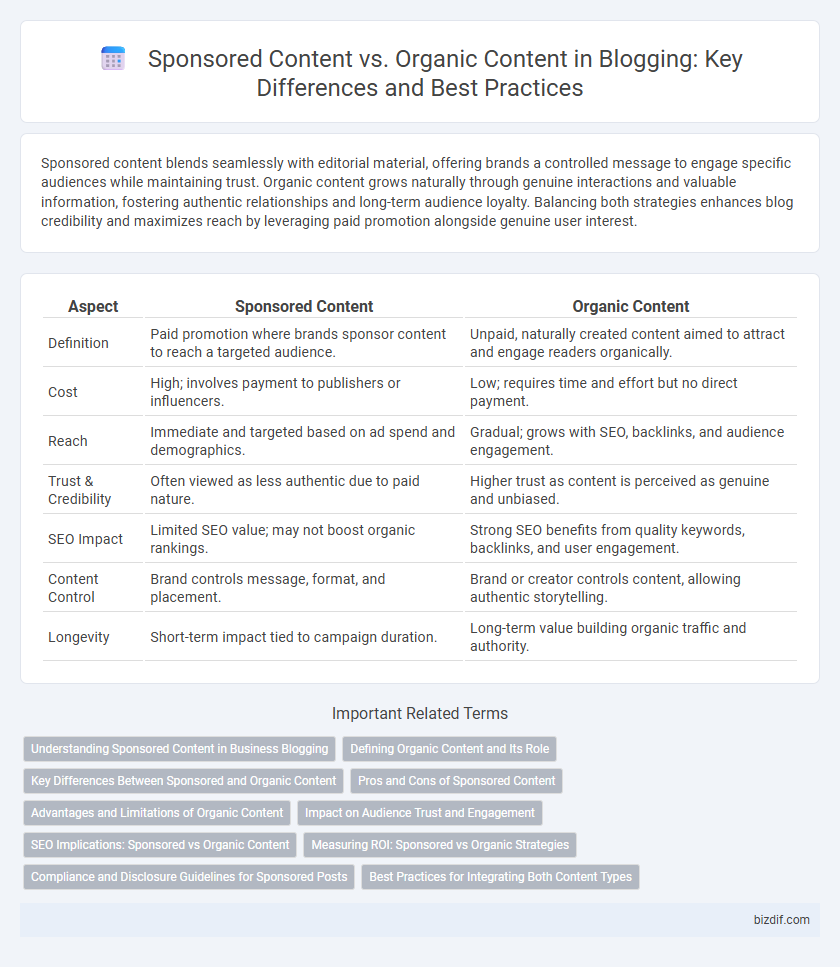Sponsored content blends seamlessly with editorial material, offering brands a controlled message to engage specific audiences while maintaining trust. Organic content grows naturally through genuine interactions and valuable information, fostering authentic relationships and long-term audience loyalty. Balancing both strategies enhances blog credibility and maximizes reach by leveraging paid promotion alongside genuine user interest.
Table of Comparison
| Aspect | Sponsored Content | Organic Content |
|---|---|---|
| Definition | Paid promotion where brands sponsor content to reach a targeted audience. | Unpaid, naturally created content aimed to attract and engage readers organically. |
| Cost | High; involves payment to publishers or influencers. | Low; requires time and effort but no direct payment. |
| Reach | Immediate and targeted based on ad spend and demographics. | Gradual; grows with SEO, backlinks, and audience engagement. |
| Trust & Credibility | Often viewed as less authentic due to paid nature. | Higher trust as content is perceived as genuine and unbiased. |
| SEO Impact | Limited SEO value; may not boost organic rankings. | Strong SEO benefits from quality keywords, backlinks, and user engagement. |
| Content Control | Brand controls message, format, and placement. | Brand or creator controls content, allowing authentic storytelling. |
| Longevity | Short-term impact tied to campaign duration. | Long-term value building organic traffic and authority. |
Understanding Sponsored Content in Business Blogging
Sponsored content in business blogging involves paid collaborations where brands create articles or posts that promote their products or services while aligning with the blog's audience interests. It boosts brand visibility and credibility by seamlessly integrating promotional messages within valuable content, enhancing user engagement without overt advertising. Businesses leverage sponsored content to drive targeted traffic, increase conversions, and build long-term customer relationships through authentic storytelling.
Defining Organic Content and Its Role
Organic content refers to blog posts, articles, or multimedia created and shared without paid promotion, aiming to attract genuine audience engagement through search engine optimization (SEO) and relevant, valuable information. Its role in blogging is crucial for building trust, fostering authentic relationships, and increasing long-term visibility by leveraging natural traffic from search engines and social shares. Effective organic content enhances domain authority and drives consistent, high-quality traffic that converts better than sponsored alternatives.
Key Differences Between Sponsored and Organic Content
Sponsored content involves paid promotions that target specific audiences to increase brand visibility, while organic content grows audience engagement naturally through genuine interactions without financial investment. The key differences lie in control and credibility: sponsored content offers precise messaging control but may be perceived as less authentic, whereas organic content builds trust over time through consistent value delivery. Performance metrics for sponsored content focus on immediate ROI and conversions, whereas organic content emphasizes long-term audience growth and loyalty.
Pros and Cons of Sponsored Content
Sponsored content offers targeted exposure with greater control over messaging and timing, making it effective for brand promotion and specific campaigns. However, it may face skepticism from audiences due to perceived bias and often requires significant investment compared to organic content. Balancing budget constraints and audience trust is crucial when leveraging sponsored posts for blog growth.
Advantages and Limitations of Organic Content
Organic content offers long-term audience trust and engagement by providing authentic and valuable information without direct advertising costs. It enhances SEO performance, driving sustainable traffic through relevant keywords and user intent alignment. However, organic content requires significant time investment to build visibility and may yield slower results compared to sponsored content's immediate reach.
Impact on Audience Trust and Engagement
Sponsored content often risks diminishing audience trust due to perceived bias, whereas organic content typically fosters authentic connections and higher engagement by delivering genuine value. Research indicates that 70% of consumers prefer organic content over sponsored posts because it appears more credible and relatable. Maintaining transparency and clearly labeling sponsored content can help mitigate trust issues and sustain audience engagement.
SEO Implications: Sponsored vs Organic Content
Sponsored content often includes nofollow or sponsored tags that limit SEO value by preventing link equity transfer, whereas organic content naturally generates backlinks and user engagement that boost search rankings. Search engines prioritize organic content for relevance and authority, enhancing visibility through authentic user interactions and genuine keyword integration. Despite sponsored content's potential for brand exposure, it offers less direct impact on SEO compared to the sustained traction organic content provides.
Measuring ROI: Sponsored vs Organic Strategies
Measuring ROI in sponsored content involves tracking direct metrics such as click-through rates, conversion rates, and cost per acquisition to evaluate immediate financial returns. Organic content ROI is assessed through long-term engagement metrics like traffic growth, search engine ranking improvements, and sustained audience interaction, reflecting brand authority and loyalty. Combining analytics tools with attribution models provides a comprehensive understanding of how each strategy drives revenue and customer retention.
Compliance and Disclosure Guidelines for Sponsored Posts
Sponsored content must strictly adhere to Federal Trade Commission (FTC) guidelines requiring clear and conspicuous disclosure of any material connections between the blogger and the brand to maintain transparency. Organic content, by contrast, is created without brand influence, thus exempt from disclosure requirements but must still align with truthful representation standards. Bloggers should use straightforward language such as "#ad" or "sponsored" to ensure compliance and build trust with their audience while avoiding potential legal repercussions.
Best Practices for Integrating Both Content Types
Effective integration of sponsored content and organic content requires maintaining authenticity and transparency to build trust with readers. Clearly distinguishing sponsored posts through proper labeling and aligning them with the blog's niche ensures relevance and enhances user engagement. Leveraging organic content's voice and storytelling alongside strategic sponsored partnerships maximizes audience retention and monetization opportunities.
Sponsored content vs Organic content Infographic

 bizdif.com
bizdif.com